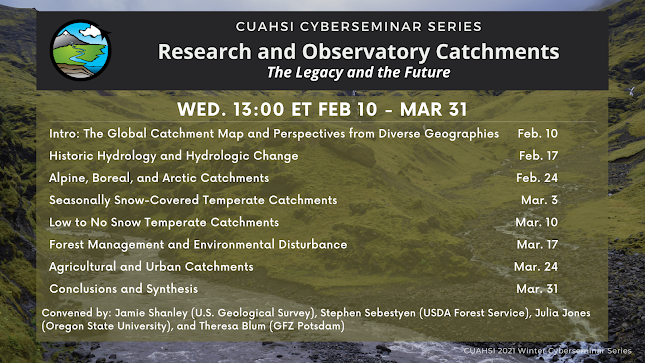CUAHSI Cyberseminar Series: Research and Observatory Catchments: the Legacy and the Future
Register Here
Submit Questions Here
Series Description
Please join catchment science researchers and CUAHSI each Wednesday at 1:00 pm ET from February 10 – March 31 for a webinar series on experimental catchment research at sites across the globe. This series will feature short- and longer-format talks and discussions on research catchments, and their value to science and society. Please attend and share your ideas on cross-site syntheses! Follow CUAHSI on twitter @CUAHSI to stay up-to-date on the latest webinar topics!
Conveners
Jamie Shanley (U.S. Geological Survey)
Stephen Sebestyen (USDA Forest Service)
Julia Jones (Oregon State University)\
Theresa Blume (GFZ Potsdam)
***
Week 1, Feb. 10. Introduction: The Global Catchment Map and Perspectives from Diverse Geographies
We will have a 10-minute introduction by the conveners featuring our Catchments of the World map, a brief overview of catchment science history, the scientific and societal value of catchments, and our goals for this speaker series.
Next will be 5 talks (10-minute slots) with perspectives from diverse geographies:
- Tim Burt, UK. Very long weather records (Oxford from 1767, Durham from 1841) and implications for local rivers.
- Manfred Staehli/Ilja van Meerfeld, Switzerland. Long-term hydrological research in the Alptal catchment, central
- Breck Bowden, USA. Long-term biogeochemical responses of an Arctic river to a changing climate: The Upper Kuparuk River Experiment.
- Jasper Slingsby, South Africa. Jonkershoek: Africa’s oldest catchment experiment - 80 years and counting.
- Irena Creed, Canada. Vulnerable waters confer watershed resilience.
Week 2, Feb. 17. Historical Hydrology and Hydrologic Change
This week is devoted to hydrology, a fundamental and unifying discipline across catchment studies. Jeff McDonnell will give an overview talk (25 mins) on how hydrologic research is foundational to catchment science, to be followed by five site-specific talks (7 mins) on catchment hydrology studies. As with each week, we will leave 15 minutes for discussion.
- Jeff McDonnell, University of Saskatchewan. The evolving perceptual model of hillslope connections to their channels: A short history
- Devendra Amatya, U.S. Forest Service. Hydrology of long-term Santee Experimental Forest catchments in coastal South Carolina, USA
- Melissa Rose, Northern Arizona University. Correlating trends in vegetation cover with water yields at the Sierra Ancha Experimental Forest using Unmanned Aerial Vehicles (UAVs)
- Mark Green, Case Western University. Changing water budgets at Hubbard Brook Experimental Forest, New Hampshire USA
- Paul Brooks, University of Utah. Long-term data from headwater catchments provides novel insights into streamflow response to climate
- Jeff McDonnell, University of Saskatchewan. The Maimai experimental catchment: Forty years of process-based research on steep, wet hillslopes.
Registration is free! To register for this talk and others in the series, click here.
Please submit any questions via this form: https://forms.gle/99M5Bcath1a252uE9
Signup to receive the CUAHSI eNewsletter here!
2021 Winter Cyberseminar Series: Research and Observatory Catchments: the Legacy and the Future
First Talk: February 10, 2021 - 1 p.m. ET
Submission Deadline: April 30, 2021
CUAHSI 2021 Biennial Colloquium
July 18 - 21, 2021 - Granlibakken Tahoe - Tahoe City, California


Comments
Post a Comment